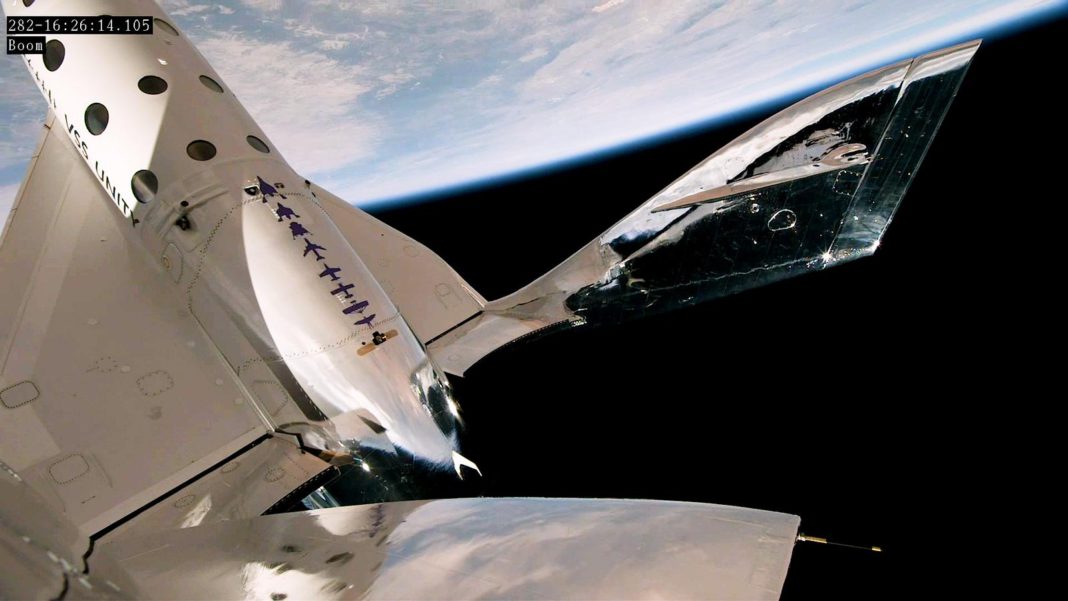UNITED STATES: Virgin Galactic achieved another significant milestone today as it completed its fifth test flight to suborbital space, bringing the company closer to its goal of commencing commercial operations soon.
The mission, named Unity 25, marked Virgin Galactic’s return to the final frontier since July 2021, when the company’s founder, Richard Branson, and other passengers embarked on a groundbreaking journey. However, the gap between Unity 25 and the next spaceflight will be much shorter.
Mike Moses, the president of spaceline missions and safety at Virgin Galactic, said during a pre-flight call on May 24 that if all goes well, the company will fly its first commercial flight in June.
The upcoming milestone mission, a research flight booked by the Italian Air Force, sets the stage for Virgin Galactic’s transition to commercial operations.
Virgin Galactic employs an air-launch system consisting of the VSS Unity space plane and the VMS Eve carrier aircraft to transport passengers and research payloads to suborbital space.
Eve releases the Unity at approximately 50,000 feet altitude, and the space plane ignites its onboard rocket motor, propelling it into suborbital space.
Passengers on Unity experience several minutes of weightlessness and witness the Earth against the backdrop of space before gliding back for a runway landing.
Unity 25, which represents the total number of test flights conducted by the space plane, took place today at 11:15 a.m. EDT (1515 GMT) from Spaceport America in New Mexico.
The mission involved eight Virgin Galactic employees, including pilots Jameel Janjua, Nicola Pecile, Mike Masucci, C.J. Sturckow, and Beth Moses, the company’s chief astronaut instructor. The mission marked Beth Moses’ third spaceflight and the first for her three fellow crew members.
During today’s flight, Unity reached a maximum speed of Mach 2.94 (nearly three times the speed of sound) and a peak altitude of 54.2 miles (87.2 kilometres), meeting the criteria for spaceflight set by NASA and the U.S. Air Force.
The crew returned after their successful mission at 12:37 p.m. EDT (1637 GMT), with both Unity and Eve safely touching down on the runway at Spaceport America.
Following the July 2021 flight, Virgin Galactic grounded Eve and Unity for maintenance and upgrades. The work primarily focused on enhancing Eve’s capabilities to support a higher flight cadence in the future.
The improvements, which include replacing Eve’s pylon, have made the Eve-Unity system more robust and resilient.
While Unity 25 served as a final checkout before the upcoming commercial launch, it also provided an opportunity to assess astronaut training practises.
The inclusion of astronaut trainers Luke Mays, Christopher Huie, and Jamila Gilbert, alongside customer representative Nicola Pecile, allowed for validation of the customer-training profile and an enhanced experience for future passengers.
Looking ahead, Virgin Galactic plans to achieve a flight rate of approximately once per month with Eve and Unity upon the commencement of commercial operations.
However, the company is already envisioning even greater frequency by developing a fleet of new “Delta-class” space planes designed for weekly flights.
This ambitious goal aims to transform space travel into a common experience for a broader range of individuals.
As Virgin Galactic progresses towards its commercial launch, it faces competition from Blue Origin, Jeff Bezos’ space tourism company.
While Blue Origin has completed six space missions with its New Shepard rocket-capsule combo, it has not flown since September 2022 due to an anomaly encountered during an uncrewed mission.
Also Read: Virgin Orbit Sells Assets Worth over $35 Million as Company Ceases Operations



